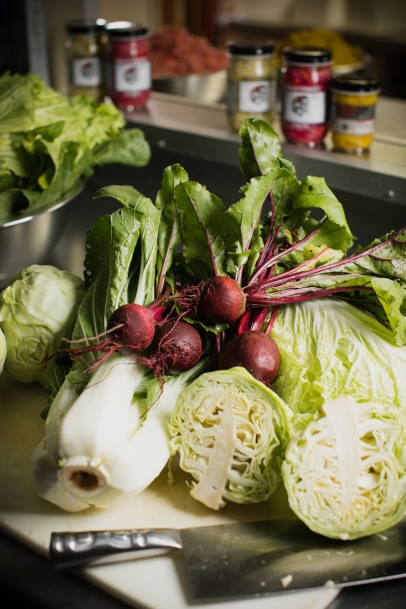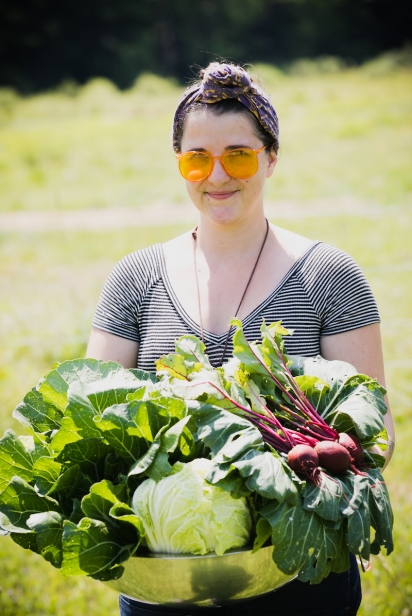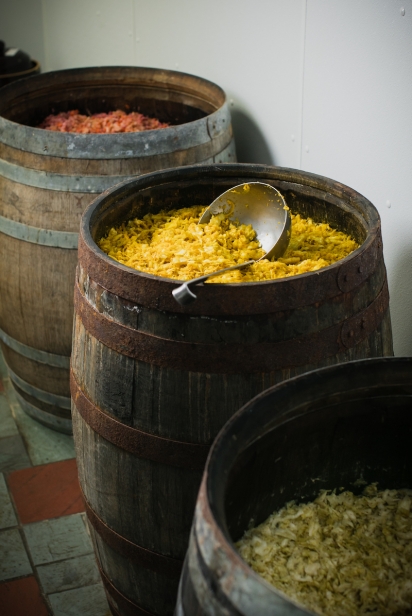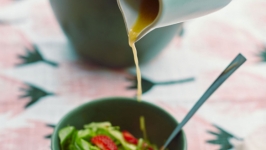Making Vegetables Weird with Vermont's Ferment Queen
I’m in the southern Vermont town of Gassetts, standing in a damp, white-walled room with no windows, and it smells. Not exactly good. Not bad, either. I can’t decide. But it smells, indeed, because I’m surrounded by a handful of oak barrels packed to the brim with fermenting vegetables.
This room, quite frankly, feels like some sort of insane asylum— appropriately named “The Cave.” And the farmer standing before me in dirty Blundstones, black jeans, a brown Carhartt coat, a blue trucker hat and thick glasses—she’s named Allie Dercoli. Vermont’s ferment queen. Queen of this cave.
“This is where vegetables come to get weird,” she tells me, nodding at the barrels. “I always say ‘weird’ when I talk about all of this. But it really is the best word to describe what I do.”
The word I would choose is “delicious.” Allie’s kimchi and krauts, collectively known as FinAllie’s Ferments, are very, very good for a lot of reasons. They’re flavorful. They go with almost any meal. They’re amazing all alone. And, most importantly, they’re really healthy—packed with natural probiotics that work like a team to keep your gut in check.
That latter point—the health—is actually why Allie does this in the first place. For years, she struggled with Crohn’s, a disease that disrupts the digestive system and causes fatigue, fever, weight loss, malnutrition, stomach pain and a lot more rough stuff. But everything changed while she was working on a farm in Texas and met a guy named Tony. Tony was a character, and a big ferment guy, to boot.
“He had these massive feet. He’d climb trees and throw rocks around for exercise—kind of like parkour but super wholesome. He was just running around in the woods all the time,” says Allie, laughing between each word. “He helped me make my first batch of kraut and taught me all about it. Then, I kept trying to learn more, went to talks, went to workshops and pretty quickly got the hang of it.”
Allie continued to travel around the States and work on various farms through the WWOOF program (World Wide Opportunities on Organic Farms). At each stop, she’d spread the ferment gospel. Make special batches for everyone. And, along the road, her Crohn’s— a disease that doesn’t have a legitimate cure and often requires surgery to battle its symptoms—went away.
“I think a lot of people have gut problems and don’t even realize it,” she says. “And there are all sorts of gut-related diseases that we never used to have. We also have more processed foods and pesticides than we’ve ever had. So, how do we get back to square one? I’m always trying to figure that out. What would our ancestors eat? They probably wouldn’t put cayenne and lemon and water in their bodies for a week straight and call it a diet.”
Allie has a point. While ferments are increasingly popular in today’s food scene, they were conceptualized thousands of years ago in Asia and have since remained a staple—especially across Korea. In fact, Allie says some kimchi-loving Koreans make a special batch when a child is born, and eat it on their 18th birthday. Way better than cigarettes and lottery tickets. “Sometimes, when I’m eating kimchi, I feel like there’s a cartoon going on inside me between these bacteria,” she adds. “It’s like a bacteria dance party.”
Things are going well for Allie. She’s hired three part-time employees to help with production. Her ferments are gaining popularity at local farmers’ markets and grace the shelves of top-notch retailers. The jars with a psychedelic hand-drawn Allie and her dog Fin (hence the name FinAllie) are tough to miss.
Perhaps most notable is Allie’s recent partnership with Black River Produce, one of the East Coast’s bigger and most esteemed food distributors. But she’s scaling on her own terms and keeping the focus on quality. Almost all her ingredients are sourced from small Vermont farms—including her own 12-acre lot, but primarily from her neighbors at Allwinds Farm—and she’s releasing product at a reasonable pace that doesn’t sacrifi ce anything.
For Allie, this all feels like a full-circle situation that was meant to be. As a kid in Ohio, where she grew up, her big Italian family would spend countless hours cooking and, more specifi cally, jarring foods in her grandfather’s basement.
“That’s where I learned all about food preservation,” she says. “We’d spend hours in his basement cutting up veggies with my whole family—aunts, uncles, everybody. Our big thing was spicy peppers, like really hot peppers with capers. My grandmother would be upstairs making sauce and it was this big community that made it happen. Everyone would walk home with a big case or two of food, and it really just felt so good to accomplish that. To still be doing this, but in a totally diff erent way of my own, is awesome.”
Before we say goodbye, Allie takes a moment of pause and leaves me with a sentiment that encapsulates this whole smelly profession just perfectly. “I guess….” She pauses again. “I guess, if we can heal bacterial communities in our guts, maybe we’d all be a little less grumpy. And maybe we’d all go about our lives a bit better. We’ll see.”
I’ll eat to that.
Allie Dercoli | @superbadasssweetdaddyjones
FinAllie’s Ferments | @finallie_ferments
Black River Produce | @blackriverproduce








